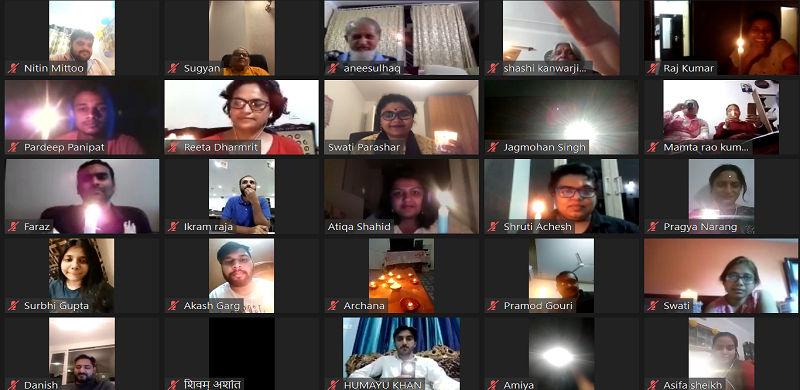
Amid COVID protocols and suspension of gathering, this year peace activists from India and Pakistan made use of technology to continue their efforts towards peace-building. For the last two years, Aaghaz-e-Dosti, an Indo-Pak Friendship Initiative, has been organising a Peace march called Aaghaz-e-Dosti peace yatra with the help of different social organisations. The activists travelled from Delhi to Attari-Wagah border with a pan India peace delegation of 80 members to lighted candles for peace at border. However, this year, an online peace vigil was organised by a collective of organisations to virtually bring together people from both sides of the border.
This year, during midnight of 14-15, around 100 people joined the online session and talked for peace, sharing their desire and commitment for harmony between the two countries. Program host Devika Mittal, who is also convener of Aaghaz-e-Dosti, India informed that they had received solidarity of many Indian and Pakistani peace organisations including Tehrik-e-Niswan, Aman ki Asha, Gandhi Global Family, Nirmala Deshpande Sansthan, National Youth Project, Paigham, Des Haryana etc., but what was actually more encouraging was requests for participation by young people who wanted to see someone from other side and they recited poetry and even Bollywood songs.
Aaghaz-e-Dosti coordinator from Pakistan, Atiqa Shahid informed that this was really a great meeting and it is a boon of science that we have technologies to meet with each other. She said that more opportunities of meeting with each other would lead to more peace and understanding. She also said that we are very fortunate that despite being small effort, we received much support from youths, common people and even family members of stalwarts like Faiz Ahmed Faiz, Asma Jahangir and Shaheed-e-Azam Bhagat Singh.
Senior Pakistani journalist and author Raza Rumi talked about the need to look towards the future and celebrating the commonalities. He said that the COVID crisis in both India and Pakistan exposed how poor our healthcare infrastructure is. He insisted that instead of looking towards reasons of conflict, both sides must focus first on priorities of people which are food, water, shelter, employment, education and health. He said that if war is to be fought, it should be waged against climate change and to protect the environment.
Academician in Gothenburg University, Sweden and an expert in peace and conflict studies Swati Parashar talked about the need to look towards conflict and its reasons too. She said that while it is true that both sides share similarities and it is definitely a bridge to connect, we must also give importance to our diversity because this (Indo-Pak) region is full of diversity and it must be cherished and valued for being different within and with each other.
This year, during midnight of 14-15, around 100 people joined the online session and talked for peace, sharing their desire and commitment for harmony between the two countries. Program host Devika Mittal, who is also convener of Aaghaz-e-Dosti, India informed that they had received solidarity of many Indian and Pakistani peace organisations including Tehrik-e-Niswan, Aman ki Asha, Gandhi Global Family, Nirmala Deshpande Sansthan, National Youth Project, Paigham, Des Haryana etc., but what was actually more encouraging was requests for participation by young people who wanted to see someone from other side and they recited poetry and even Bollywood songs.
Aaghaz-e-Dosti coordinator from Pakistan, Atiqa Shahid informed that this was really a great meeting and it is a boon of science that we have technologies to meet with each other. She said that more opportunities of meeting with each other would lead to more peace and understanding. She also said that we are very fortunate that despite being small effort, we received much support from youths, common people and even family members of stalwarts like Faiz Ahmed Faiz, Asma Jahangir and Shaheed-e-Azam Bhagat Singh.
Senior Pakistani journalist and author Raza Rumi talked about the need to look towards the future and celebrating the commonalities. He said that the COVID crisis in both India and Pakistan exposed how poor our healthcare infrastructure is. He insisted that instead of looking towards reasons of conflict, both sides must focus first on priorities of people which are food, water, shelter, employment, education and health. He said that if war is to be fought, it should be waged against climate change and to protect the environment.
Academician in Gothenburg University, Sweden and an expert in peace and conflict studies Swati Parashar talked about the need to look towards conflict and its reasons too. She said that while it is true that both sides share similarities and it is definitely a bridge to connect, we must also give importance to our diversity because this (Indo-Pak) region is full of diversity and it must be cherished and valued for being different within and with each other.
